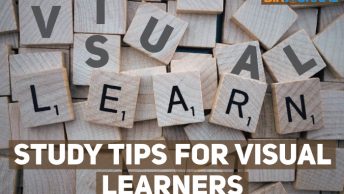Most people know that listening to music helps some people study, while hindering others. What many don’t realize is the type of music can make a huge difference for certain types of learners, making some types of music an option as a study help for people who think it does them no good.
That isn’t to say that music helps everyone. It doesn’t. How helpful it can be often varies from topic to topic, too, for people. But it can certainly help more people than realize it. (Some people consider this a separate learning style element, called aural.)
First figure out if words distract you with music—and I don’t mean if you’re distracted when one of your favorite songs comes on the radio that you don’t hear often and want to sing along with. Do words distract you as a rule? If so, you’ll have to bear that in mind while seeking a form of music, always finding an instrumental version of the style you’re testing. Are you more distracted by music you know well or intriguing new songs? Make sure you pick and stick to the one that will cause the least distraction.
Secondly, pick something to study. Make sure you stick to that specific type of studying (i.e., memorization, concept learning, mathematics) for the entire time you’re trying to isolate the best form of music for it.
Now run a few base tests with styles to try to narrow it down a bit. Try a few styles you like or can at least tolerate, like easy listening, Celtic, classical, and rock. If you’re familiar with the concept of “minor key” (it’s what makes most Celtic, Gothic, and New Age music depressing to some people and relaxing to others), try to notice if you study better with minor or major key.
If you prefer major key, next test a few music genres of that style. Gospel music, classical, pop, and rock are usually in the major key. Admittedly, some of these will be difficult to find instrumental versions for if that’s what you need, but it may be worth the study results. Artists often have samples online you can use to test, and you can always ask friends to borrow their CDs if they can trust you to return them.
For minor key, you may at first find it a bit more difficult. At a glance, your only option is Celtic or New Age—soft stuff, quite easy to find instrumental versions of, but what about those who work better with heavier music. This is where such genres as Celtic and Gothic rock come in, which are actually quite similar, so don’t panic at the “Gothic” name. Most people find it pretty if they don’t know what they’re listening to; it’s a technical term with historical roots, but if you’re predisposed to suicidal tendencies, please avoid those that do have depressing lyrics for your own safety.
If you’re unable to distinguish the keys, try to isolate characteristics of music that helps you even only a little to figure out what genre will help you the most. If you have to, you can compile the characteristics.
Once you’ve narrowed it down to a genre that helps you with that style of studying, congratulations! You’re ready to restart the process for another form, or you could just stick to the type of music you’ve isolated for studying in general till you have time to run another test. But be willing to turn the music off if necessary—just because it helps you concentrate on the math doesn’t mean it’ll help you with memorization.
Now that you know what you need, you might want to consider adding another style of music to your study bag: techno. Sometimes called “dance,” this is the rapid-beat music that restaurants play at busy times in the background so people move out quickly. A number of people find it annoying, but if you can even tolerate it, it might help you when you’re trying to accomplish something swiftly, like research and writing for a paper. Note—it also drives your pulse up the roof, so be careful with it.
It may sound silly, but do have a care with all music. It has biological effects besides damaging your hearing when you blare it too loudly. It can raise and lower your blood pressure, raise or lessen bodily stress, and some lyrics can have you thinking things you don’t generally—or ever—say or do. Have fun in picking your music style(s) needed for learning, and test numerous styles, but be cautious, too!














thankyou guy(s) very much i have found techno incredibly helpful for my essay writing. it speeds me up and actually stops me from getting distracted!
thankyou guy(s) very much i have found techno incredibly helpful for my essay writing. it speeds me up and actually stops me from getting distracted!
Funny how this article doesnt mention much of the music that people listen to today. Like rnb or rap.
Funny how this article doesnt mention much of the music that people listen to today. Like rnb or rap.
Most people know that listening to music helps some people study, while hindering others. What many don’t realize is the type of music can make a huge difference for certain types of learners, making some types of music an option as a study help for people who think it does them no good.
That isn’t to say that music helps everyone. It doesn’t. How helpful it can be often varies from topic to topic, too, for people. But it can certainly help more people than realize it. (Some people consider this a separate learning style element, called aural.)
First figure out if words distract you with music—and I don’t mean if you’re distracted when one of your favorite songs comes on the radio that you don’t hear often and want to sing along with. Do words distract you as a rule? If so, you’ll have to bear that in mind while seeking a form of music, always finding an instrumental version of the style you’re testing. Are you more distracted by music you know well or intriguing new songs? Make sure you pick and stick to the one that will cause the least distraction.
Secondly, pick something to study. Make sure you stick to that specific type of studying (i.e., memorization, concept learning, mathematics) for the entire time you’re trying to isolate the best form of music for it.
Now run a few base tests with styles to try to narrow it down a bit. Try a few styles you like or can at least tolerate, like easy listening, Celtic, classical, and rock. If you’re familiar with the concept of “minor key” (it’s what makes most Celtic, Gothic, and New Age music depressing to some people and relaxing to others), try to notice if you study better with minor or major key.
If you prefer major key, next test a few music genres of that style. Gospel music, classical, pop, and rock are usually in the major key. Admittedly, some of these will be difficult to find instrumental versions for if that’s what you need, but it may be worth the study results. Artists often have samples online you can use to test, and you can always ask friends to borrow their CDs if they can trust you to return them.
For minor key, you may at first find it a bit more difficult. At a glance, your only option is Celtic or New Age—soft stuff, quite easy to find instrumental versions of, but what about those who work better with heavier music. This is where such genres as Celtic and Gothic rock come in, which are actually quite similar, so don’t panic at the “Gothic” name. Most people find it pretty if they don’t know what they’re listening to; it’s a technical term with historical roots, but if you’re predisposed to suicidal tendencies, please avoid those that do have depressing lyrics for your own safety.
If you’re unable to distinguish the keys, try to isolate characteristics of music that helps you even only a little to figure out what genre will help you the most. If you have to, you can compile the characteristics.
Once you’ve narrowed it down to a genre that helps you with that style of studying, congratulations! You’re ready to restart the process for another form, or you could just stick to the type of music you’ve isolated for studying in general till you have time to run another test. But be willing to turn the music off if necessary—just because it helps you concentrate on the math doesn’t mean it’ll help you with memorization.
Now that you know what you need, you might want to consider adding another style of music to your study bag: techno. Sometimes called “dance,” this is the rapid-beat music that restaurants play at busy times in the background so people move out quickly. A number of people find it annoying, but if you can even tolerate it, it might help you when you’re trying to accomplish something swiftly, like research and writing for a paper. Note—it also drives your pulse up the roof, so be careful with it.
It may sound silly, but do have a care with all music. It has biological effects besides damaging your hearing when you blare it too loudly. It can raise and lower your blood pressure, raise or lessen bodily stress, and some lyrics can have you thinking things you don’t generally—or ever—say or do. Have fun in picking your music style(s) needed for learning, and test numerous styles, but be cautious, too!
Most people know that listening to music helps some people study, while hindering others. What many don’t realize is the type of music can make a huge difference for certain types of learners, making some types of music an option as a study help for people who think it does them no good.
That isn’t to say that music helps everyone. It doesn’t. How helpful it can be often varies from topic to topic, too, for people. But it can certainly help more people than realize it. (Some people consider this a separate learning style element, called aural.)
First figure out if words distract you with music—and I don’t mean if you’re distracted when one of your favorite songs comes on the radio that you don’t hear often and want to sing along with. Do words distract you as a rule? If so, you’ll have to bear that in mind while seeking a form of music, always finding an instrumental version of the style you’re testing. Are you more distracted by music you know well or intriguing new songs? Make sure you pick and stick to the one that will cause the least distraction.
Secondly, pick something to study. Make sure you stick to that specific type of studying (i.e., memorization, concept learning, mathematics) for the entire time you’re trying to isolate the best form of music for it.
Now run a few base tests with styles to try to narrow it down a bit. Try a few styles you like or can at least tolerate, like easy listening, Celtic, classical, and rock. If you’re familiar with the concept of “minor key” (it’s what makes most Celtic, Gothic, and New Age music depressing to some people and relaxing to others), try to notice if you study better with minor or major key.
If you prefer major key, next test a few music genres of that style. Gospel music, classical, pop, and rock are usually in the major key. Admittedly, some of these will be difficult to find instrumental versions for if that’s what you need, but it may be worth the study results. Artists often have samples online you can use to test, and you can always ask friends to borrow their CDs if they can trust you to return them.
For minor key, you may at first find it a bit more difficult. At a glance, your only option is Celtic or New Age—soft stuff, quite easy to find instrumental versions of, but what about those who work better with heavier music. This is where such genres as Celtic and Gothic rock come in, which are actually quite similar, so don’t panic at the “Gothic” name. Most people find it pretty if they don’t know what they’re listening to; it’s a technical term with historical roots, but if you’re predisposed to suicidal tendencies, please avoid those that do have depressing lyrics for your own safety.
If you’re unable to distinguish the keys, try to isolate characteristics of music that helps you even only a little to figure out what genre will help you the most. If you have to, you can compile the characteristics.
Once you’ve narrowed it down to a genre that helps you with that style of studying, congratulations! You’re ready to restart the process for another form, or you could just stick to the type of music you’ve isolated for studying in general till you have time to run another test. But be willing to turn the music off if necessary—just because it helps you concentrate on the math doesn’t mean it’ll help you with memorization.
Now that you know what you need, you might want to consider adding another style of music to your study bag: techno. Sometimes called “dance,” this is the rapid-beat music that restaurants play at busy times in the background so people move out quickly. A number of people find it annoying, but if you can even tolerate it, it might help you when you’re trying to accomplish something swiftly, like research and writing for a paper. Note—it also drives your pulse up the roof, so be careful with it.
It may sound silly, but do have a care with all music. It has biological effects besides damaging your hearing when you blare it too loudly. It can raise and lower your blood pressure, raise or lessen bodily stress, and some lyrics can have you thinking things you don’t generally—or ever—say or do. Have fun in picking your music style(s) needed for learning, and test numerous styles, but be cautious, too!
I like this site. It actually admitted that music can be helpful.
I like this site. It actually admitted that music can be helpful.
Im doing a science fair project on music and how it affects me if i do well on a test while Im studying for it and I need some help do you think you can give me some help because Im also having to write a one page research on my project due tomorrow can you give me some very good and factoral information thanks.
Im doing a science fair project on music and how it affects me if i do well on a test while Im studying for it and I need some help do you think you can give me some help because Im also having to write a one page research on my project due tomorrow can you give me some very good and factoral information thanks.
Interesting post, I will let my family and friends know about this blog
cheers.
Interesting post, I will let my family and friends know about this blog
cheers.
Yeah, techno oddly enough helps a lot. It is great background music and a lot of it has little to no lyrics, so nothing but the music to distract you.
Yeah, techno oddly enough helps a lot. It is great background music and a lot of it has little to no lyrics, so nothing but the music to distract you.
COOOOL
COOOOL
that's because they suck
This article has really helped me for some research, as I am testing the affect that music has on your ability to recall information for my Year 10 Student Research Project. I'm gonna test at least 50 people, so I wonder which genre of music will result in the most productive amount of study??!
this article helped me ace my HSC, use it, it can help.
This article was very helpful and informational for my research.Thank you!
i like this becouse i am doing the same thing and mine i dew in tow weeks though (read this back words) woh dlo era uoy
very helpful site. i like this very much! will visit this again, soon. thank you!
gee wow thanks i listen to alot of music for relaxation im sure it’l help il try ouut some methods to improve on my math studying, thank yu. ???
Great information thanks for sharing this with us.In fact in all posts of this blog their is something to learn. your work is very good and i appreciate your work and hopping for some more informative posts. Again thanks
This article has really helped me for some research,
According to your information that is very simple and clearly understand for students to grip.
Thanks for your research on academic knowledge.
[…] Directory Journal says that we should first “figure out if words distract you with music—and I don’t mean […]
This is such a nice post, Trance Music is one genre that is good for studying. It is pure instrumental, then there are minor keys or depressing and major keys which are happy in Trance Music. It boosts your energy too so you will not be tired while studying.
Hey thanks 4 da article i have found hip hop really helpful for my hw!!!
Hi im really impressed by your research, I’m doing a study of the affects of listening to music while studying and would like to interview you by email if possible?
thanks this just gave me the science fair project i needed:D
wow..this is great i used this topic for my science project and it rocked…educational and fun…good topic..but for me classical music was best…at least i studied better and aced in my exams and plus it was relaxing.
Haha, I’m about to start writing a paper right now and I’m listening to Skrillex. I thought I was crazy for listening to dubstep while I do homework. I’m glad to see that other people do that too xD
Music from other languages help me.
hi thank for this, I was telling my science teacher to let me listen to music.